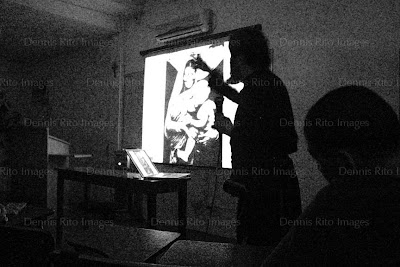Pitik 3
 It was my nth time to attend photography forum which is organized by Konrad Adenauer Asian Center for Journalism at the Ateneo de Manila University in cooperation with World Press Photo in the recently held Pitik 3: Forum Series on Photojournalism and my second time to hear Dr. Shahidul Alam, Director of Drik Picture Library and Founder of Chobi Mela Festival of Photography in Asia (Bangladesh) who discussed “Imaging the South in the Globalized World.” With him present was Dave Clark, Course Leader, International Photojournalism, Documentary and Travel Photography, University of Bolton (UK) and Dalian China/ Panos Pictures London who discussed ‘International Image Economy and Representations” and Alison Morley, chairperson, Photojournalism and Documentary Photography Program at International Center of Photography (ICP) who talked about “Recent Trends in Photojournalism and Documentary Photography.”
It was my nth time to attend photography forum which is organized by Konrad Adenauer Asian Center for Journalism at the Ateneo de Manila University in cooperation with World Press Photo in the recently held Pitik 3: Forum Series on Photojournalism and my second time to hear Dr. Shahidul Alam, Director of Drik Picture Library and Founder of Chobi Mela Festival of Photography in Asia (Bangladesh) who discussed “Imaging the South in the Globalized World.” With him present was Dave Clark, Course Leader, International Photojournalism, Documentary and Travel Photography, University of Bolton (UK) and Dalian China/ Panos Pictures London who discussed ‘International Image Economy and Representations” and Alison Morley, chairperson, Photojournalism and Documentary Photography Program at International Center of Photography (ICP) who talked about “Recent Trends in Photojournalism and Documentary Photography.”I took interest on things discussed by Dr. Shahidul Alam and Mr. Dave Clark (no, he’s not the singer your grandma knows), particularly the issue on how the world’s images are being controlled by large organizations/ photo agencies. It was they ‘who control what the world want to see’ and how these images are being used. Two contrasting issues was the use of foreign photographers, who flew in with lack of knowledgeable of the issue, culture and subject vis-à-vis local photographers who is more knowledgeable of the issues, its culture and have access to the subjects. It was apparent that local photographers can do the work in a more efficient and timely manner but due to lack of access to publications/ publishers, local photographers have a hard time getting in. But this trend was being reversed in Bangladesh with the establishment of Drik Picture Library under its visionary, Dr. Alam. A pioneering effort ‘to represent a group of media professionals that other agencies did not cater for.’
"It was seventeen years ago. A small group of people set up a picture agency in the unlikely location of Dhaka, the capital of Bangladesh. Named Drik, the Sanskrit word for vision, the agency set out to represent a group of media professionals that other agencies did not cater for, practitioners living and working in the majority world. In the years that have followed, many others from Asia, Africa and Latin America have joined the original group. All of them share a common vision; one that sees the majority world, not as fodder for disaster reporting, but as a vibrant source of human energy and a challenge to an exploitative global economic system.
Drik's social commitment is central to its work ethos. While its professional team making up the library, darkroom, studio, gallery and publication, multimedia and Internet departments provides state of the art media products for an international clientele, it also provides support for its network of creative individuals around the world who challenge western media hegemony. Its training programmes range from providing education for working class children to training the region's brightest young photojournalists through Pathshala, its education wing, where top professionals from Magnum, National Geographic, Time, Contact Press Images and other leading media organisations make up the visiting faculty. The launch of the first festival of photography in Asia, Chobi Mela, and Drik Partnership, a global conglomerate consisting of some of the most innovative organisations in Asia, Africa and Europe, will ensure that the majority world continues to carve out a space for itself in world media. "
Will this happen in the Philippines? It is for the new and upcoming photographers to answer these for themselves.
And if i may borrow the saying... The future belongs to the brave!
Comments
here's the URL: http://dsrito.multiply.com/